Smiling is contagious. Science has demonstrated multiple times that seeing someone else smile triggers an automatic response.  A smile, whether genuine or false, triggers certain facial muscles which tells the brain that you’re happy and boosts the mood as it activates neuropeptides in the brain which stimulate the release of dopamine, endorphins and serotonin, and decrease stress-enhancing hormones such as cortisol and adrenaline.
A smile, whether genuine or false, triggers certain facial muscles which tells the brain that you’re happy and boosts the mood as it activates neuropeptides in the brain which stimulate the release of dopamine, endorphins and serotonin, and decrease stress-enhancing hormones such as cortisol and adrenaline.
But that’s not all – it can also help heart health, lower blood pressure, boost the immune system, reduce pain, and maybe even help you live longer, in addition to making you look more attractive and appear more confident! So smiling is good for your health, in which case we need to ensure that our oral health is good so that we are not embarrassed to smile more often.
Our teeth are essential to our life, they help us to chew our food so that we can digest it easier and absorb the nutrients vital for the health of our body. Teeth help us to form words, and give shape and structure to our face.  Our teeth are also emergency tools for breaking threads, ripping open packets and sachets, and even opening bottles, although we do so at our peril. And of course they help form our facial expressions and smile a hello.
Our teeth are also emergency tools for breaking threads, ripping open packets and sachets, and even opening bottles, although we do so at our peril. And of course they help form our facial expressions and smile a hello.
Dental plaque is the main enemy to our teeth and gums. Plaque is a translucent sticky film that forms on the surface of the teeth, full of bacteria which produce acids after eating or drinking. If the roots are exposed due to receding gums, a symptom of gum disease, plaque can also form on the roots of the teeth and even break down the bones which support the teeth. Left unchecked the plaque will eventually harden to become calculus, also known as tartar which is visible on the teeth.
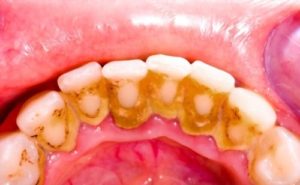 Plaque keeps the acids in contact with the tooth enamel and can cause tooth decay by way of small holes or cavities, which will necessitate the need for fillings, and if the decay is not treated may cause the nerve to become infected, causing severe pain or even an abscess, which will require painful root canal treatment or result in the loss of the tooth.
Plaque keeps the acids in contact with the tooth enamel and can cause tooth decay by way of small holes or cavities, which will necessitate the need for fillings, and if the decay is not treated may cause the nerve to become infected, causing severe pain or even an abscess, which will require painful root canal treatment or result in the loss of the tooth.
While our gums may seem secondary to our teeth, they are just as important. It’s our gums which hold our teeth in place, and our gums can influence our health overall.
 A buildup of plaque and tartar accumulates harmful bacteria which in turn causes inflammation of the gums, and can lead to bleeding of the gums and gingivitis. Swollen gums will cause discomfort, and often pain, when chewing, and may cause a bad taste in the mouth and halitosis, or bad breath, which won’t go away.
A buildup of plaque and tartar accumulates harmful bacteria which in turn causes inflammation of the gums, and can lead to bleeding of the gums and gingivitis. Swollen gums will cause discomfort, and often pain, when chewing, and may cause a bad taste in the mouth and halitosis, or bad breath, which won’t go away.
Gingivitis can be reversed in its early stage with rigorous cleaning and flossing to remove the bacteria. As in the gut, the mouth is a complex ecosystem of bacteria, both good and bad, known in this case as a micro biome, and an imbalance in the bacteria reduces protection to the gums and allows pathogens to invade the area, ultimately leading to periodontal disease which can cause the gums to swell and pull away from the teeth, exposing the roots. Periodontal disease is the major cause of tooth loss in adults.
Scientists now understand that it is not actually the bacteria which causes gum disease, but the inflammation triggered which is the body’s natural defense. The immune system initiates a response by sending white blood cells to the area to destroy the bacteria but also damages the gum tissue.
Now for the bad news, it is estimated that approximately 90% of adults over the age of 30 are suffering from some type of active gum disease, and worse still about 65% of those aged just 16 and above. More alarming is the impact that periodontitis (periodontal disease) has on the overall health of the body. Untreated it can cause the immune system to become hyper defensive, which in turn can increase the risk of allergic reactions, or even lead to the immune system believing that everything entering the body is an allergen. Worst case scenario, it can increase the chances of developing an autoimmune disorder, causing the body to even attack healthy cells. Moreover, untreated gum disease can also allow bacteria to enter the bloodstream, causing further health complications. Inflammation in the mouth is to be avoided at all costs since inflammation is linked to a number of serious chronic diseases.
Bacteria from the mouth can spread through the bloodstream and attach to the inner lining of the endocardium (the innermost layer of tissue lining the chambers of the heart) causing inflammation and a condition known as bacterial endocarditis. Although many are successfully treated with antibiotics, surgery may be required to repair or replace damaged heart valves, and remove any stubborn lingering infection.
 The bacteria also produces protein which can cause blood platelets to stick together, forming clots, clogging arteries and reducing blood flow, and preventing the heart from receiving the nutrients and oxygen it needs. Severe disruption to blood flow can lead to a stroke or heart attack.
The bacteria also produces protein which can cause blood platelets to stick together, forming clots, clogging arteries and reducing blood flow, and preventing the heart from receiving the nutrients and oxygen it needs. Severe disruption to blood flow can lead to a stroke or heart attack.
Research has shown people with gum disease are almost twice as likely to suffer from coronary artery (heart) disease than those without. Likewise, it has been shown that people who have had a stroke are more likely to be suffering from gum disease than those who have not.
The lungs can also become contaminated with bacteria from the mouth, leading to pneumonia and other respiratory diseases or infections, or exasperating an existing condition. This is particularly dangerous for the elderly who are more vulnerable to the effects of respiratory conditions, and it is therefore vital that any gum disease is kept under control.
Having periodontitis increases the risk of a premature birth and subsequent low birth weight. It is believed that gum disease may increase levels of the chemicals which induce labour. In fact women with gum disease are three times more likely to have a premature birth, and there is a one-in-four chance that the birth will be prior to 35 weeks.
Research has also shown that the risk for developing diabetes also increases with gum disease. And vice versa, due to the increased risk of infections, a person with diabetes is highly likely to develop gum disease, which also increases blood sugar levels, and due to slower wound healing is more likely to lead to tooth-loss. The same research has indicated that treating periodontitis reduces the severity of diabetes.
One more reason to take care of your gums? It is estimated that people with healthy gums are 70% less likely to develop Alzheimer’s disease than those who have a long history of gum disease.
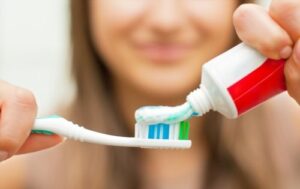 That’s the bad news. So what can we do to protect ourselves against periodontal disease? Well the good news is that gum disease and tooth decay is almost entirely preventable. Brush your teeth at least twice a day, and floss before bedtime to remove any food and bacteria between the teeth. Avoid sugary foods and drinks to reduce the likelihood of tooth decay. Teeth stained by tobacco, or drinking lots of red wine, tea or coffee is merely a form of wear and tear on the teeth and is not detrimental to their health, just maybe your confidence!
That’s the bad news. So what can we do to protect ourselves against periodontal disease? Well the good news is that gum disease and tooth decay is almost entirely preventable. Brush your teeth at least twice a day, and floss before bedtime to remove any food and bacteria between the teeth. Avoid sugary foods and drinks to reduce the likelihood of tooth decay. Teeth stained by tobacco, or drinking lots of red wine, tea or coffee is merely a form of wear and tear on the teeth and is not detrimental to their health, just maybe your confidence!
Whilst it is advantageous to brush after eating or drinking to remove plaque and prevent staining, never do so until at least one hour later as acids produced weaken the enamel which could become damaged with exaggerated or aggressive brushing. Visit the dentist at least every six months for a check-up, and to remove tartar buildup.
People who smoke or drink are more likely to suffer from receding gums, so try to cut back or stop if possible, and ensure that no dentist visits are missed since the dentist will be able to catch the problem early and take precautionary measures. Similarly people who grind their teeth are highly likely to suffer from receding gums and increased tooth and gum sensitivity, so a mouthguard can help to alleviate this problem.
Natural botonics give us a natural way to help fight the bacteria leading to tooth decay and gum disease which can be added to your usual oral health routine:
Oil Pulling

This may be a new idea to many of us and is definitely trending nowadays, but it is certainly not a new concept, being a part of Ayurvedic medicine, a traditional Indian system, that dates back more than 3,000 years. The idea is to use a natural vegetable oil as a natural mouthwash, swishing it around your mouth for 15-20 minutes, forcing it between the crevices in your teeth, dislodging any debris and taking advantage of the natural anti-inflammatory, antibacterial and antifungal properties before spitting it out. The oil attracts and traps pathogens which may cause plaque, gum disease and bad breath, and neutralises the odour from any pungent food consumed. Oil pulling also helps to moisturise the gums and increase the production of saliva which can reduce bacteria further
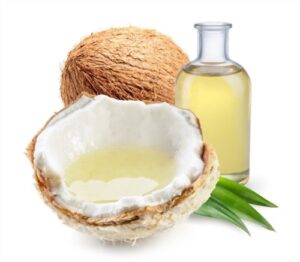 Coconut Oil
Coconut Oil
Coconut oil is made almost entirely of medium-chain triglycerides, of which 50% is lauric acid, making it the richest source of lauric acid known to man. Lauric acid is more effective at killing bacteria, fungi and viruses than any other saturated fatty acid. One study compared the ability of 30 different fatty acids to kill bacteria, and found lauric acid to be the most effective, meaning that it can effectively kill the harmful pathogens causing tooth decay, gum disease and bad breath, and decrease the buildup of plaque.
It is also known to kill streptococcus mutans and lactobacillus, the leading causes of tooth decay. In fact, it was found to be as effective as one of the active ingredients used in commercial mouthwashes: in a study, involving 60 participants suffering plaque-induced gum disease, oil pulling with coconut oil was shown to significantly decrease the plaque build-up and reduce signs of gingivitis. Furthermore, the plaque was significantly decreased after 7 days and continued to decrease throughout the 30 day study period. At the end of the study, plaque was decreased by 68% and the gingivitis score by approximately 56%.
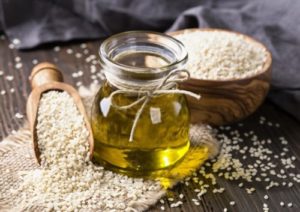 Sesame Oil
Sesame Oil
Sesame oil is the traditional oil used within Ayurvedic medicine for oil pulling, perhaps because of its high calcium content – the consumption of one teaspoon a day of sesame oil can provide the body with the recommended calcium intake. Oil pulling with sesame oil has been the subject of literally dozens of studies, and all found sesame oil to be as effective as a commercial mouthwash for reducing the bacteria which can lead to plaque, gingivitis and bad breath. Like coconut oil, sesame oil is effective against the types of bacteria which are the leading cause of plaque.
How to do it:
Put a tablespoon of your chosen oil in your mouth (sesame has a lighter consistency but coconut may be more palatable). Swish the oil around the mouth for 15-20 minutes, first thing in the morning, forcing it between the teeth. Since 15-20 minutes can seem like an eternity, especially as the oil volume increases with saliva, it is best to start with just 5 minutes and build up the time. Make sure not to swallow any of the oil since it contains the harmful bacteria, and spit it out into the toilet or trash to ensure that it doesn’t clog the sink (especially coconut which will solidify on contact with cold water). Brush your teeth as normal.
There are also claims that oil pulling can help to whiten the teeth by pulling off the stain, but there is no scientific data available to support this. However, in order to make this a teeth whitening exercise, you can add a few drops of orange essential oil, which contains the d-limonene, a compound known to aid with teeth whitening.
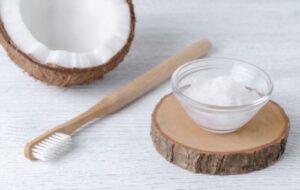 Or add a few drops of orange oil to a solution of coconut oil and baking powder and brush your teeth with this solution, although this should be limited to twice a week since the baking powder can be abrasive to the enamel.
Or add a few drops of orange oil to a solution of coconut oil and baking powder and brush your teeth with this solution, although this should be limited to twice a week since the baking powder can be abrasive to the enamel.
Warning – you may read about cleaning your teeth with a solution of baking powder and vinegar, and whilst this may effectively lift stains in your bathroom and kitchen, it is not recommended on the teeth as the acid in the vinegar can erode the enamel on the teeth.
There are also a number of other essential oils which can be added to the oil pulling solution, or even to your normal toothpaste, in order to take advantage of their therapeutic benefits, always taking care to ensure that they are never swallowed:
Clove Essential Oil
Clove oil has long been used as a home remedy for toothache and eugenol, a compound found in cloves with anesthetic and antibacterial properties, has had its niche in dentistry since the 19th century. Clove oil is also antifungal and anti-inflammatory and clinical research confirms its ability to diminish tooth pain, relieve bad breath and reduce gum disease, in addition to flighting mouth infections.
In the event of toothache, add a few drops of clove oil to ½ to 1 teaspoon of a carrier oil, for example coconut or sesame, mix thoroughly and use a cotton wool ball to apply to the affected area for several minutes at a time. Repeat as required.
Cinnamon Essential Oil
Cinnamon is also now a fairly common ingredient within toothpaste. It is antibacterial, antifungal, antimicrobial and antiseptic. Several studies have found cinnamon to be effective against streptococcus mutans, a bacteria which is the common cause of tooth decay and enamel erosion. A couple of studies have indicated its effectiveness against enterococcus faecalis, another common cause of gum disease, and particularly prevalent in those who have had root canal surgery.
Cinnamon oil is also effective against candida which is responsible for oral thrush, and furthermore, can prevent biofilm, a layer of bacteria or fungi which forms on the teeth and within the mouth, and can progress to plaque and gum disease if left untreated. Due to its ability to stimulate blood circulation, cinnamon oil is known to enhance healthy gums.
Eucalyptus Essential Oil
Eucalyptus essential oil has analgesic, anti-inflammatory, antibacterial and antiplaque properties, which according to research allows it to effectively fight gum disease and tooth decay, and eliminate bad breath.
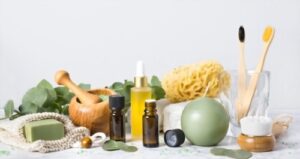 Ylang-Ylang Essential Oil
Ylang-Ylang Essential Oil
Ylang-ylang, probably best known for its use within the cosmetic industry and aromatherapy, possesses antibacterial and anti-inflammatory properties. It inhibits biofilm, thus effectively fighting gum disease and tooth decay, and kills the bacteria contributing to bad breath.
Peppermint Essential Oil
Probably the most widely used oils within the oral care industry, peppermint oil has antibacterial, antimicrobial, and antifungal properties. It can inhibit biofilm, oral candida, and the bacteria which causes bad breath. Plus of course, peppermint oil has a refreshing, uplifting taste.
So look after your teeth, and look after your general health. Just one more incentive – one study indicated that people over the age of 70 with 20 or more teeth, had a longer life expectancy than those with less teeth!!!






